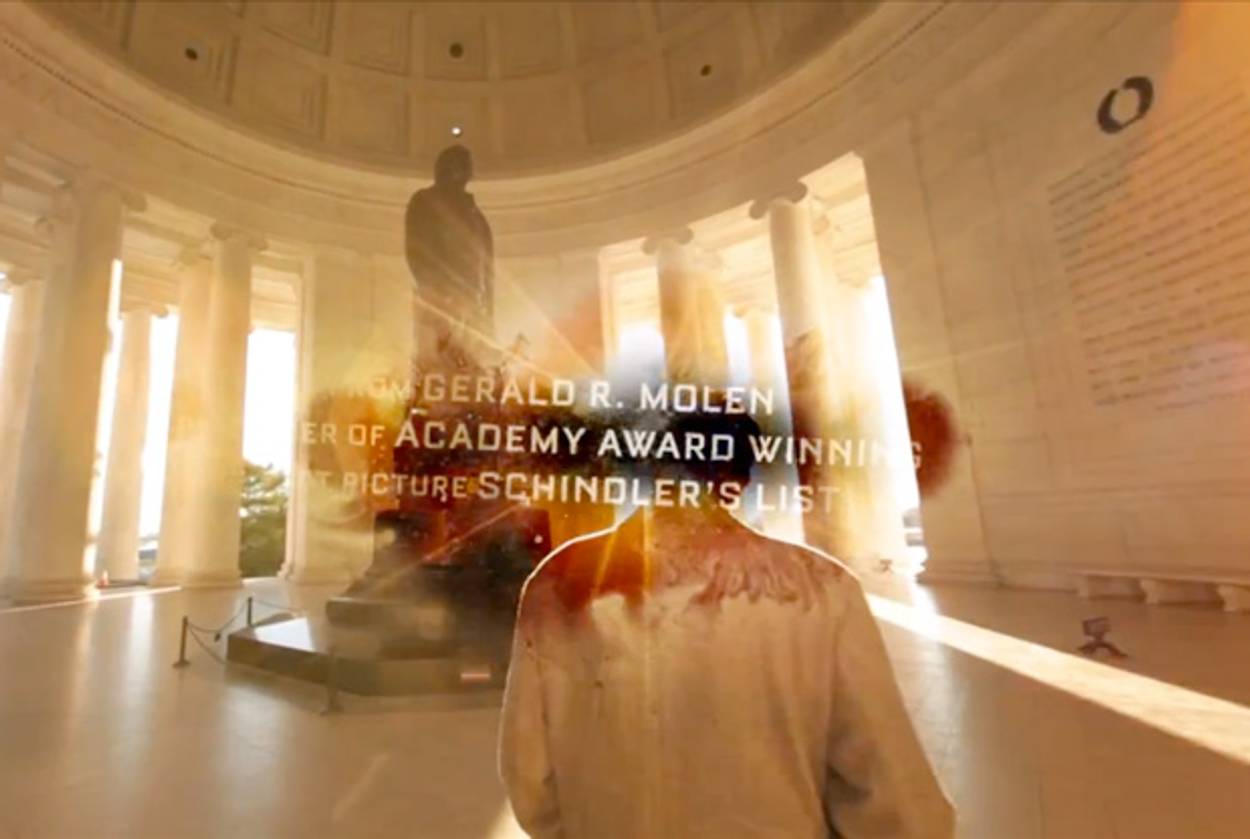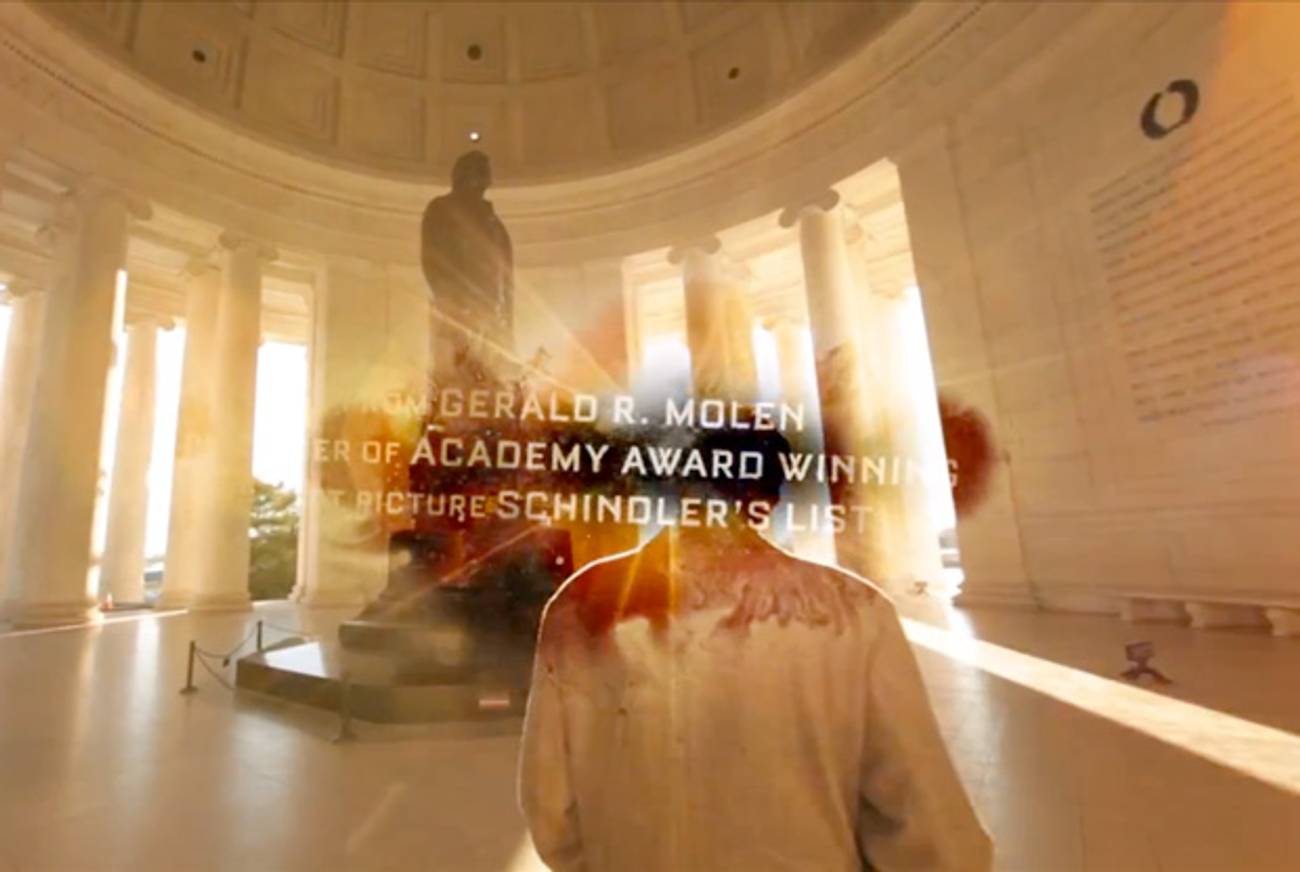Schindler Backer’s Agitprop
Gerald Molen, the Oscar-winning producer behind Schindler’s List, is adding an anti-Obama film to his résumé




The trailer for 2016: Obama’s America, a new political documentary out this summer starring the conservative pundit Dinesh D’Souza and based on his controversial 2010 book, The Roots of Obama’s Rage, has all the hallmarks of current right-wing agitprop. There are shadowy images of the president and his ubiquitous “Hope” posters set against snapshots of impoverished African cities and rioting mobs, snippets of Obama’s triumphant 2008 victory speech in Chicago’s Grant Park, and lingering panoramas of the dawn-lit Capitol and Lincoln Memorial. It also carries a credit line most partisan filmmakers could only dream of: “From Gerald R. Molen, producer of Academy Award-winning best picture Schindler’s List.”
It’s a connection that lends the movie instant credibility—and the filmmakers aren’t shying away from emphasizing the connection. D’Souza drew cheers and whistles when he mentioned the Schindler link in a speech at last winter’s Conservative Political Action Conference in Washington. Attendees at the annual convention of the Faith and Freedom Coalition, a conservative group founded by former Christian Coalition head Ralph Reed, added their applause after a trailer screening. The conservative news site Breitbart.com ran a post hyping the film as Molen’s political retort to his Schindler co-producer: director Steven Spielberg, a major Democratic donor.
Molen, who spent decades supervising productions not just for Spielberg but for other prominent Democratic donors like Robert Redford and Sydney Pollack, makes a peculiar ideologue. Though he’s always been a Republican—he was particularly enthusiastic about Ronald Reagan in 1980 after Jimmy Carter’s handling of the Iranian hostage crisis—“I wasn’t really involved in politics,” he told me in a telephone interview from his home in Bigfork, Mt. His last big project was Minority Report, with Spielberg and Tom Cruise, in 2002; he’s never been involved in an explicitly partisan film before. “I have no design on making political movies,” Molen told me. “It’s not what I’m about.” But, he went on, “I’m working on this because it’s a story I think needs to be told.”
Yet in joining forces with D’Souza, Molen has attached himself to a lightning rod. Born in India, D’Souza has made a career of being super-patriotic about his adopted country, and of late he has shifted his entire focus to questioning the president’s patriotism.
The Roots of Obama’s Rage is a Talmudic parsing of Obama’s Dreams From My Father, and it is premised on the idea that Obama’s entire worldview was shaped by the anticolonial sentiments of his Kenyan father, whom the president met just once after his parents split. D’Souza claims he’s qualified to make the determination because of his own childhood experience in postcolonial India, and the subtext is that Obama’s Americanness is somehow suspect or deficient. It’s an argument that puts D’Souza a half-step away from birtherism, a far-right trope that the conservative columnist George Will has exhorted his party to reject.
But Molen said D’Souza had illuminated exactly what he finds so troubling about Obama’s vision for America. “Dinesh says, ‘I’m a Third World guy who’s embraced America and he’s an American guy who’s embraced the Third World,’ ” Molen told me. “Each saw the country in a different way, and one’s an American and one wasn’t, but Dinesh is a true American.” He said he particularly wanted undecided swing voters to see the movie. “For me, it’s more for the individual who is riding the fence and doesn’t really understand,” Molen said. “It doesn’t take a mental giant to see the course this country is on is a disaster.”
***
Molen moved from Montana to Los Angeles as a child after his parents lost their farm in the wake of World War II. His father opened a café across the street from the Republic Pictures lot. “They were from old-school America, and they had this drive,” Molen said. After graduating from high school, Molen joined the Marines, and when he got out he went to work at Republic as a truck driver. In 1959, he went to Universal Pictures, where he eventually became the head of transportation before striking out on his own. His credits include Tootsie, The Postman Always Rings Twice, Ordinary People, and The Color Purple—his first film for Spielberg, and the film he says changed his life. In 1990, after working on Batteries Not Included; Bright Lights, Big City; and Rain Man, Molen became head of production for Spielberg’s company, Amblin Entertainment, where he produced Hook, the Jurassic Park films, and Twister.
Schindler’s List came up in early 1992, amid preparations for Jurassic Park. “Steven turned to me and said, ‘I’d like to do Schindler’s List,’ so I said, ‘OK, let me think about how to do this,’ ” Molen told me. He brought on Branko Lustig, a Croatian survivor of Auschwitz and Bergen-Belsen who had worked as a location manager in Europe for Fiddler on the Roof and a production supervisor for Sophie’s Choice, to serve as a third producer. Molen regularly describes the experience as the most profound of his life. “Some of my Jewish friends would say it was bashert,” said Molen, who is Mormon. “The impact it had was phenomenal.”
The movie opened the floodgates of memory for many survivors, and Molen played a key role in setting up the Shoah Foundation, which sent videographers to record interviews with almost 52,000 Holocaust survivors. Molen conducted the 50,000th interview himself, with his Schindler co-producer Lustig, in 1999, and still chokes up talking about it. “Jerry had a deep emotional connection to it,” said James Moll, one of the founding executive directors of the Shoah Foundation. “He was not just a numbers and logistics guy by any means—he definitely has a strong connection with the Holocaust survivors and keeping the memory of the Holocaust alive.”
Moll, like others Molen worked with, said he could not recall ever discussing politics together, though he knew Molen was conservative. “I always say I wish there were more people like him,” said Moll, who produced films for the Democratic National Convention in 2004 and 2008. “He’s a man who could give Republicans a good name.”
“I never hid my feelings, but there was never any reason to,” Molen told me. “When you’re working on a film, the goal is always the next day, and as a production manager that was my focus.” But one of his favorite stories about being on the Schindler’s List set is about a man who approached the crew one night at their hotel. “He said, ‘I survived the Warsaw ghetto, and let me tell you, never give up your guns,’ ” Molen told me. “So, that was a great lesson for me, because we had so much going on in this country then about the Second Amendment.” Yet he added that he’d been happy to meet Hillary Clinton, who was then first lady, and Al Gore, then vice-president, when they visited Spielberg. “Steven was a Democrat since I can remember,” Molen said. “It never made me think any less of him.” (Representatives for Spielberg did not respond to requests for comment from Tablet.)
But the era in which politics could be politely discussed in Hollywood has passed, according to Molen. “When we were doing Tootsie in New York I remember sitting around a poker table on a Saturday night talking about the political issues of the day,” Molen said. “We could have our disagreements but we talked and went out to dinner as friends. It’s too hard now.”
With Obama’s America, Molen is marching directly into the breach. The film, whose $3 million budget was partly funded by TD Ameritrade founder Joe Ricketts, purports to introduce viewers to the “real” Barack Obama, an effort D’Souza described to the CPAC audience as “a journey into the heart of Obama.” It’s already been sufficiently controversial to get Molen disinvited from a speaking engagement at a Montana high school.
Molen’s former colleagues say that he has every right to invoke his Schindler credentials, even though some find the project politically objectionable. “It’s legitimate for him to use it, since he is the producer of Jurassic Park and Schindler’s List,” said June Beallor, a founding director of the Shoah Foundation, who oversaw the film unit for the 2004 Democratic National Convention and produced films for the 2008 convention. “It’s a shame that these are his beliefs, but it’s his right.”
Molen said he had read D’Souza’s book before he was approached about turning it into a film. “I’m in my short years,” said Molen, who is 77. “My feeling is right now we do not have a strong protector of Israel, someone who is watching out for Israel and some of the finer things about America.” D’Souza called him on the recommendation of mutual friends, Molen said. (D’Souza was traveling and was not available for an interview.) “I said, I’m in,” Molen said. “All of us love to get lost in a great book but there’s something about the visual message, visual storytelling.” Molen said it was a lesson he learned from Schindler’s List. “When the book came out, a lot of people pooh-poohed it,” Molen said. “But when it came out on film, people raved.”
***
Like this article? Sign up for our Daily Digest to get Tablet Magazine’s new content in your inbox each morning.
Allison Hoffman is a senior editor at Tablet Magazine. Her Twitter feed is @allisont_dc.
Allison Hoffman is a senior editor at Tablet Magazine. Her Twitter feed is @allisont_dc.